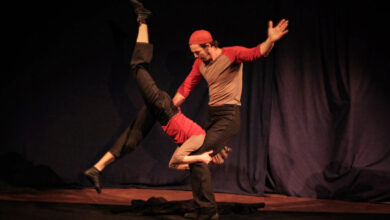Review: Billy Budd, Wilton’s Music Hall
Atmospheric staging and stirring music give Melville’s tale new power, but this could have really soared without the scripts in hand. Rating
Good
Billy Budd, adapted from Herman Melville’s novella, is not often staged outside of Benjamin Britten’s famous opera. In this bold new version, adapted and directed by Mark Leipacher, the story is retold through sea shanties, spoken scenes, and a fluidly minimalist staging. The result is an atmospheric and thought-provoking evening at Wilton’s Music Hall that finds freshness in a well-worn tale.
Only four performers bring the narrative to life, each playing multiple roles. This stripped-back approach proves surprisingly effective. The sea shanties, sometimes adapted to advance the plot, add vigour and texture, anchoring the production in its maritime world. The performers move seamlessly from role to role, supported by earthy props and evocative lighting that fill the hall with a salty atmosphere.
Jack Heydon, as Billy, stands out with a clear, lyrical voice and a disarming charm that captures the character’s innocence. He grounds the production with sincerity and warmth. Nadia Nadif also impresses, her versatile singing and character work bringing variety and depth to the piece. The ensemble as a whole works well together, embodying officers, sailors, and accusers with sharp differentiation.
Musically, the evening is mostly strong. There are moments where the tuning slips, yet the overall vocal quality and energy carry through. What may catch some audiences by surprise, however, is the format: despite being billed as a staged concert, the performers remain entirely reliant on scripts, even when singing. This approach inevitably softens some of the dramatic impact, and the occasional fluffed line suggests the production is still settling into its stride. Yet this also makes clear how much potential there is for the drama to deepen once the performers are liberated from their books.
The first half also suffers from pacing. Much of it is taken up with scene-setting and expository passages that feel heavy when read aloud. By contrast, the second half is much sharper, with greater dramatic tension and emotional impact. Particularly striking are two carefully choreographed fight scenes, performed in slow motion, which become moments of visual poetry: exquisitely executed, they provide pauses for reflection that heighten rather than interrupt the action. The climactic trial scenes and chilling coda are equally strong. The closing commentary on press corruption, patriotism, and racism feels pointed and contemporary, with one line about patriotism as “the refuge of the scoundrel” even drawing a shocked gasp from the audience.
Wilton’s Music Hall proves an inspired venue. Its crumbling grandeur heightens the sense of history, while Can Bitirim’s lighting design is outstanding, highly well-informed, and sculpts atmosphere from smoke and shadow.
Despite some reservations, the production succeeds as a moving and imaginative reimagining of Melville’s tale. It blends music and drama with invention, draws strong performances from its cast, and leaves its audience reflecting on the dangers of blind loyalty and misplaced patriotism. Already a compelling piece, it promises even greater dramatic force in future iterations.
Directed and adapted by Mark Leipacher
Musical direction and arrangements by Stephen Higgins
Set and costume design by Holly Pigott
Associate set and costume design by Ellen Farrell
Lighting by Can Bitirim
Production videography by Derrick Oppong
Stage management by Freddie Sherwood
Artistic associate: Rachel Valentine Smith
Presented by The Faction
xx plays at xx until xx.






